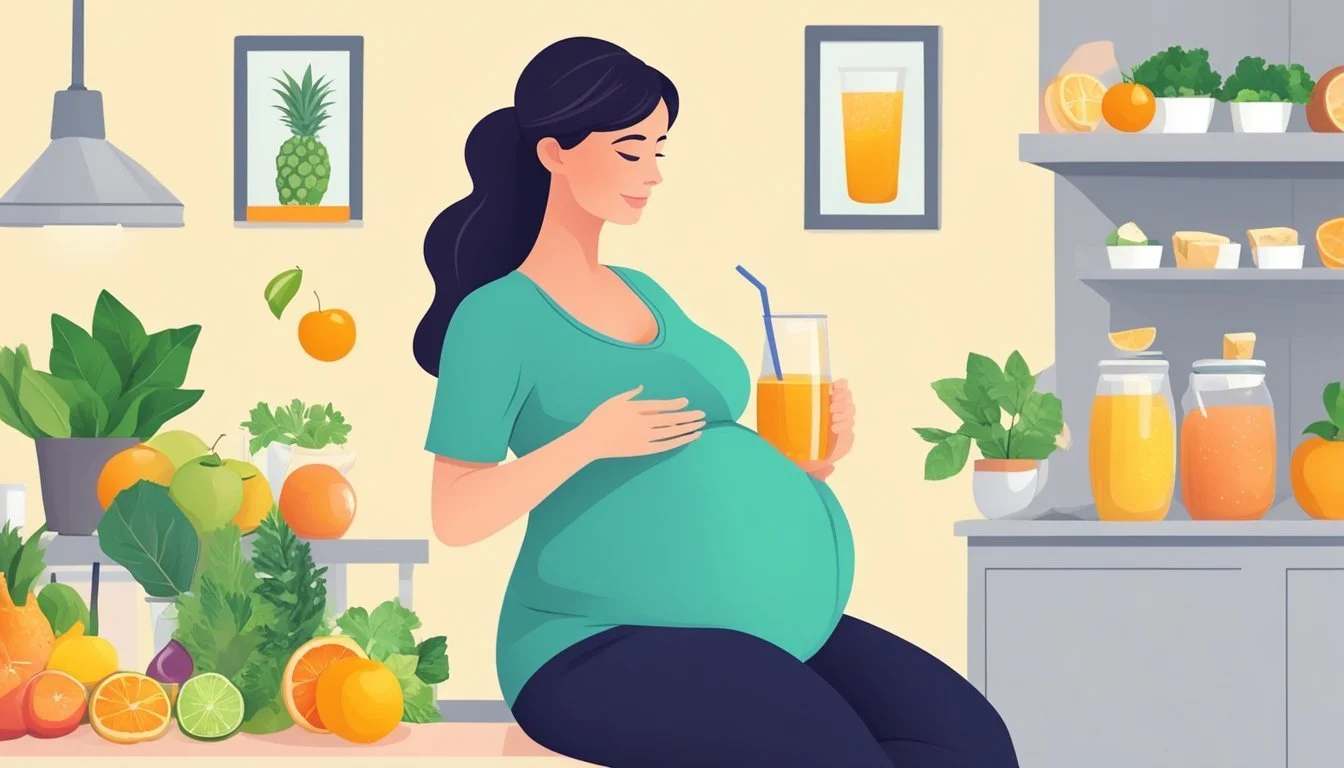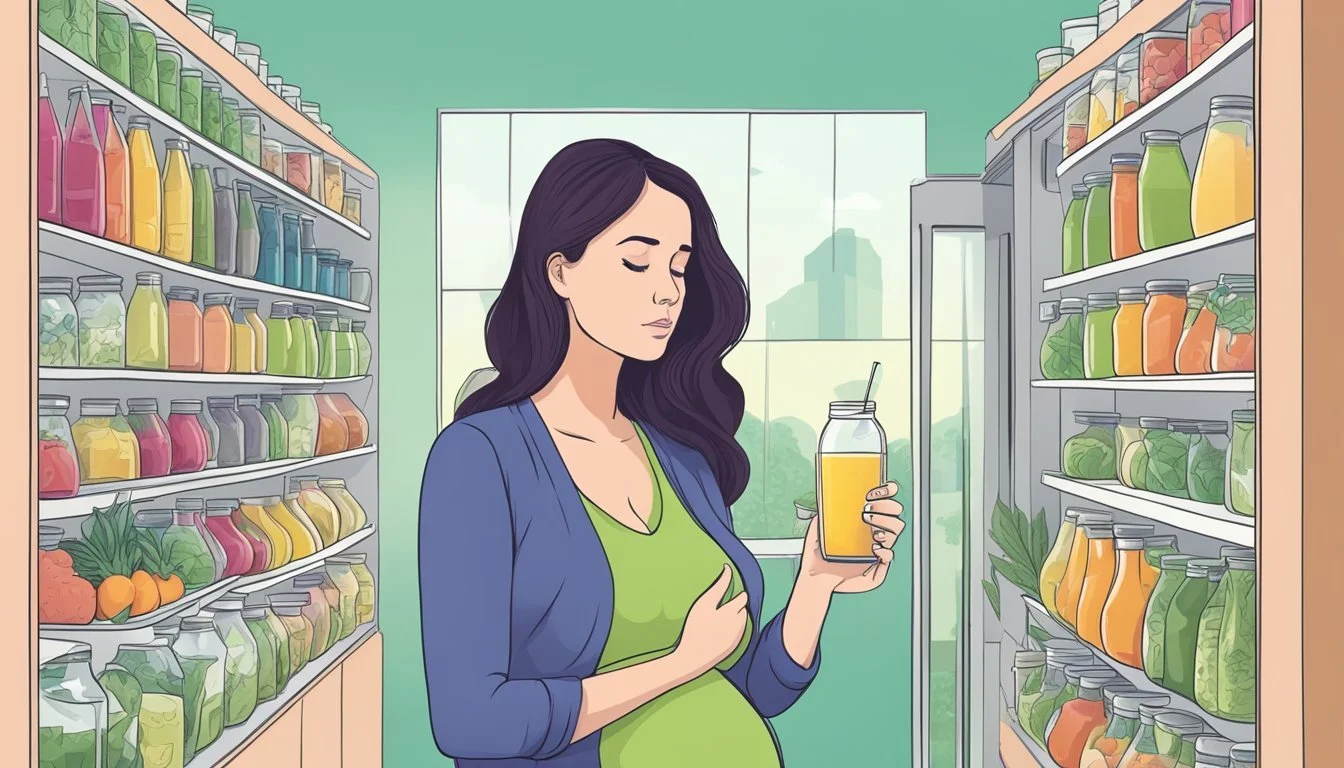Is it safe to continue a juice cleanse while pregnant?
Understanding the Risks and Precautions
Pregnancy requires careful consideration of nutritional choices, as the health of both the expectant mother and the baby is paramount. As trends like juice cleanses become more popular for their potential detoxifying and health benefits, it is essential to scrutinize their safety for pregnant women. Juice cleanses typically involve consuming only fruit and vegetable juices for a certain period to ostensibly rid the body of toxins. However, engaging in such a restrictive diet during pregnancy poses several risks and may not provide the complete nutrition that both the mother and developing fetus need.
Medical professionals generally advise against participating in a juice cleanse while pregnant. The practice could lead to inadequate calorie and protein intake, which are critical for the baby's proper growth and development. Moreover, unpasteurized juices are often used in cleanses, which raises the risk of foodborne illnesses potentially harmful to both the mother and the baby. The natural sugars found in juices may also lead to excessive weight gain and an imbalance in blood sugar levels.
In some cases, consuming freshly made fruit and vegetable juices as part of a balanced diet can be beneficial for pregnant women due to the additional vitamins, minerals, and antioxidants provided. However, it is imperative to ensure that these juices are pasteurized to eliminate any potential health risks. Pregnant women should prioritize a balanced and varied diet, adequate in calories and nutrients, over the latest diet trends, and should always consult with a healthcare provider before making any significant dietary changes.
Understanding Juice Cleanses
Juice cleanses are a nutrition regimen where individuals consume primarily juice extracted from fruits and vegetables, often as a means of "detoxing" the body.
Basics of Juice Cleansing
Juice cleansing involves consuming juices made from various fruits and vegetables in place of regular meals. The primary goal is to give the digestive system a rest and to supply nutrients directly in the form of juices. Typical cleanses can last from a day to several weeks. Juices used in cleanses usually exclude the fiber that is naturally present in whole fruits and vegetables.
Potential Benefits and Claims
Proponents claim that juice cleanses can help the body remove toxins, improve energy levels, aid digestion, and provide essential vitamins and minerals. These claims center around the idea that by eliminating solid food and potential allergens, the body can flush out impurities. Antioxidants found in fruits and vegetables like kale, spinach, and berries are also believed to play a role in neutralizing free radicals in the body.
Common Ingredients in Juice Cleanses
Juice cleanses often incorporate a variety of ingredients known for their nutritional benefits:
Fruits: Apples, pineapples, and lemons are popular for their sweet taste and high vitamin content.
Vegetables: Kale, celery, cucumber, carrot, and spinach are chosen for their mineral content and low-calorie profile.
Additives: Ginger is frequently added for its potential anti-inflammatory properties.
Frequently, ingredients are combined in a juice recipe to provide a balance of flavor and nutrients, with a typical juice blend including a green vegetable like spinach or kale, a sweet fruit like apple or pineapple, a base like cucumber or celery, and a zesty component like lemon or ginger.
Risks and Considerations for Pregnant Women
When considering a juice cleanse during pregnancy, it is crucial to weigh the potential risks and the specific nutritional needs of both the mother and the fetus. This section explores the vital considerations to ensure health and safety during this critical period.
Nutritional Needs During Pregnancy
Pregnant women require a balanced diet rich in vitamins, minerals, and fiber to support fetal development and their own health. Following the established nutritional guidelines, pregnant women should aim for at least five portions of fruits and vegetables daily. These should be varied to provide a wide range of nutrients. Juicing may lead to a reduction in the fiber content of the produce, which is important for digestive health.
Risks of Unpasteurized Juices
Consuming unpasteurized juices during pregnancy poses significant health risks due to potential bacteria such as Salmonella, Listeria, E. coli, and Toxoplasma. These microorganisms can bypass the placental barrier, potentially leading to severe health concerns for the fetus, including neurological issues or stillbirth. Therefore, it is advised that pregnant women only consume pasteurized juice products to minimize these risks.
Impact on Blood Sugar and Gestational Diabetes
Juice cleanses can drastically alter a pregnant woman's blood sugar levels due to the high natural sugar concentration found in fruit juices. Such spikes in blood sugar can increase the risk of gestational diabetes, a condition that poses health concerns for both the mother and the fetus. It is vital to be mindful of juice intake and opt for a balanced pregnancy diet over a juice-only approach.
Evaluating Juice Cleanse Safety
When considering a juice cleanse during pregnancy, it's essential to be aware of FDA guidelines, the importance of pasteurization, and precautions for home juicing to make informed decisions concerning health and safety.
FDA Guidelines and Medical Recommendations
The U.S. Food and Drug Administration (FDA) advises pregnant individuals to exercise caution with certain foods and beverages, including unpasteurized juices, due to the increased risk of foodborne illness. Medical professionals generally recommend that those who are pregnant adhere to a well-balanced diet, rich in fiber, to support fetal development and personal health. Juices, especially unpasteurized ones, may lack essential nutrients like fiber and can pose a risk of exposure to harmful bacteria such as E. coli and Listeria.
Understanding Pasteurization
Pasteurization is a process that heats liquids to a specific temperature for a set period to kill harmful bacteria without significantly impacting the nutritional value of the juice. This process is particularly vital for pregnant women, who are more susceptible to foodborne illnesses, as pasteurized juices are considered safe and carry a lower risk of bacterial contamination.
Precautions for Home Juicing
When creating homemade juices, several precautions are necessary to minimize health risks:
Use of a clean juicer: Ensure that the juicer and all related equipment are thoroughly washed to remove potential bacteria.
Selection of ingredients: Opt for fresh, well-washed produce to reduce the presence of contaminants.
Immediate consumption: Homemade juices should be consumed immediately after preparation since the lack of pasteurization increases the risk of bacterial growth if the juice is stored.
In conclusion, while juice cleanses might be sought for their potential health benefits, during pregnancy it is crucial to prioritize safety and nutritional adequacy. Pregnant individuals should consult their doctor before starting a juice cleanse or making significant dietary changes.
Alternatives and Safe Practices
Expectant mothers considering juice cleanses need to prioritize the baby's and their health by seeking alternatives that ensure essential nutrients are adequately consumed without the risks associated with unpasteurized juices and aggressive detox regimens.
Integrating Juices with a Balanced Diet
Expectant mothers may incorporate fresh juices into their diet, ensuring they do not replace meals but rather complement a balanced diet. A healthy pregnancy diet should include a variety of foods to provide essential nutrients, proteins, vitamins, and fiber. Juices should be a part of a diet that includes whole fruits and vegetables, grains, and adequate protein to support the immune system and the developing baby.
Recommendation: Add one glass of juice daily as a snack, not a meal substitute.
Tip: Choose juices with vibrant colors for a wider nutrient range.
Pregnancy-Safe Juicing Options
When juicing during pregnancy, safety is paramount. Always use pasteurized or cold-pressed juices to reduce the risk of infections that could harm the mother or baby. Using organic foods minimizes exposure to pesticides, and thorough cleaning with a fruit and vegetable wash is advised. Store juices in a glass container to avoid contaminants.
Safe Choice: Cold-pressed juice stored in glass.
Note: Pasteurization kills harmful bacteria without significant nutrient loss.
Adjusting Juice Cleanses for Pregnancy
Traditional juice cleanses often include periods of fasting, which are not recommended during pregnancy. Instead of fasting, pregnant women can adjust by using juices to supplement meals with additional vitamins and minerals. Smoothies with added fiber can be a more suitable option, as they keep the digestive system moving, helping with common pregnancy issues like constipation, and provide a more substantial nutrient profile.
Substitute: Use smoothies with added fiber instead of pure juice cleanses.
Caution: Avoid aggressive detox programs; gentle incorporation is key.
Additional Tips for Pregnant Women Considering a Juice Cleanse
When pregnant, it's crucial to focus on the safety and nutritional value of any dietary choices, including a juice cleanse. These additional tips are geared toward ensuring that critical nutritional needs are met and risks are minimized.
Monitor Macronutrients and Hydration
Macronutrients—carbohydrates, proteins, and fats—are essential for the growth and development of the fetus. Pregnant women should track their intake to ensure they're getting enough calories and protein each day. Juicing primarily provides carbohydrates and may lack sufficient protein and fats. Hydration is equally important, and women should aim to drink at least 8-12 glasses of water daily, aside from the juice, to maintain proper fluid balance.
Protein: Aim for at least 70 grams per day.
Calories: An additional 300-500 calories per day are typically required during pregnancy.
Hydration: Ensure adequate water intake for optimal bodily functions.
Consultation with Healthcare Providers
Before beginning a juice cleanse, it is advisable to consult with a healthcare provider. This consultation is vital to address any potential risks related to pregnancy diet or pre-existing health conditions. Doctors or dietitians can provide personalized advice and may suggest appropriate supplements to compensate for any nutritional gaps during the cleanse.
Consult healthcare providers about:
The safety of detox during pregnancy
Advisable supplement intake
Managing morning sickness
Post-Cleanse Nutrition and Transitioning
After the juice cleanse, transitioning back to a balanced diet that includes whole foods is imperative for continued fetal growth and preparation for breastfeeding. Including foods high in fiber can aid digestion and provide sustained energy. Reintroduction of solid foods should be gradual to avoid digestive issues. It's important to prioritize nutrient-dense foods that support immunity and overall health.
Transition with:
Gradual reintroduction of solid foods
Emphasis on high-fiber and nutrient-dense foods
Preparation for post-pregnancy nutrition and breastfeeding requirements
Specific Concerns and FAQs
When considering a juice cleanse during pregnancy, it is crucial to be aware of the specific health concerns such as potential allergies and the impacts on morning sickness and digestion. Pregnant individuals must approach any dietary change with caution and consult healthcare professionals.
Potential Allergic Reactions and Sensitivities
Pregnant women may experience changes in their immune system, making them more susceptible to food sensitivities and allergic reactions. Juice cleanses often involve consuming large quantities of fruits and vegetables which can sometimes contain allergens. For instance, some people may be allergic to certain compounds in citrus fruits, commonly high in Vitamin C, a component often included in juices for its health benefits.
Common allergens in juices:
Citrus fruits (potential Vitamin C allergen)
Kiwi
Strawberries
Effects on Morning Sickness and Digestion
During pregnancy, morning sickness and digestive issues like constipation can be common concerns. Juices, especially those high in sugar, can sometimes exacerbate these issues. However, ingredients such as ginger may alleviate nausea for some women. It is essential to understand that the body's response can vary greatly and what may provide relief for one person could potentially worsen symptoms for another.
Impact on digestion:
High-sugar juices: May worsen morning sickness
Ginger-based juices: Might help with nausea
Frequently Asked Questions by Expectant Mothers
Pregnant individuals often have questions about the safety and health implications of juice cleanses.
Can a juice cleanse meet my nutritional needs during pregnancy?
Juice cleanses lack important nutrients like protein and fiber, vital for pregnancy health.
Is it safe to detox while pregnant?
Detoxing is generally discouraged during pregnancy due to potential risks to both mother and fetus.
Could a juice cleanse impact my baby’s development?
Insufficient nutrients from a restrictive diet like a juice cleanse could affect fetal growth.
Conclusion and Final Thoughts
When considering a juice cleanse during pregnancy, the priority should be the safety and nutritional needs of both the mother and the developing fetus. Juice cleanses typically lack essential nutrients and may pose a risk due to unpasteurized juices, which can contain harmful bacteria.
Nutrient Deficiency: Juice cleanses often do not provide sufficient protein, healthy fats, and certain vitamins and minerals, which are crucial for fetal development.
Blood Sugar Levels: They may lead to spikes in blood sugar levels, which are not recommended, especially for those at risk of gestational diabetes.
Unpasteurized Juices: These pose a danger of foodborne illness and should be avoided.
Incorporating a variety of fruits and vegetables is beneficial; however, they should be a part of a balanced diet. Pregnant individuals should aim for at least five portions of fresh produce daily, in diverse forms (fresh, canned, frozen, dried) to ensure they receive wide-ranging nutrients.
Seeking guidance from a healthcare professional is important before starting or continuing any detox or cleanse regimen during pregnancy. They may suggest safer alternatives to support the health of the mother and baby.
It is generally advised to avoid juice cleanses during pregnancy and instead focus on a balanced, nutrient-rich diet tailored to prenatal health. This approach helps to safeguard the well-being of both the mother and developing baby.






